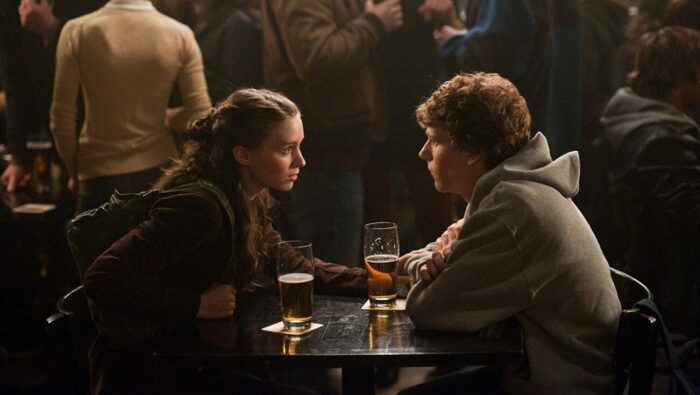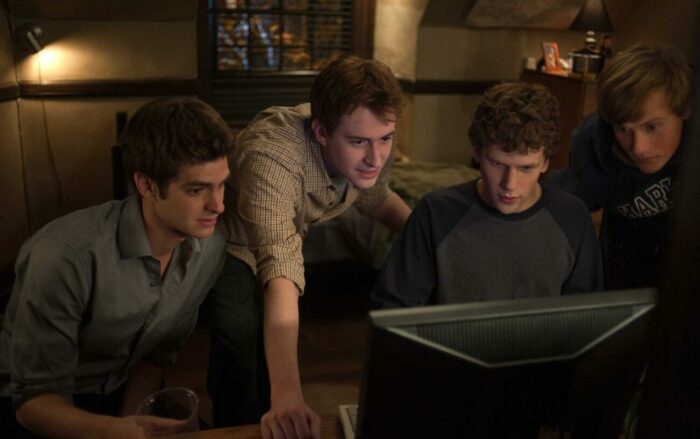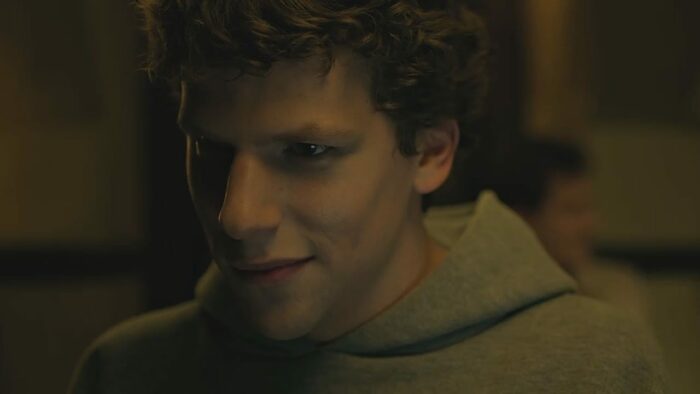Ten years ago, The Social Network from director David Fincher wasn’t a college roommate comedy. It wasn’t a long legal drama either. It wasn’t an underdog entrepreneur story about invention and the modern American dream. It wasn’t an examination allegory about the societal craze of Facebook and social networking that was coming on strong. Those themes were present, but at its core, The Social Network was about a guy trying to impress a girl with money and status. Any high-minded ingenuity always came back to love and acceptance.
It’s in the decade since that those other elements have taken over the film’s legacy. Social media has multiplied and coalesced like to the point where its a programmed business instead of a public utility, one creating emerging cautionary tales in documentaries like The Social Dilemma. People look at Facebook or Twitter, from the CEOs on down to the DIY so-called “influencers” and their subscriber-made millions, and see money before anything else.
Those other messages from The Social Network that took a backseat to bitter heartstrings have become the things most don’t care to hear about. Especially in these tough socioeconomic times, no one wants to hear the problems of the rich and successful. No one wants to hear about how their feelings were hurt, their pride was damaged, or that their life was minutely encumbered, let alone ruined.
In 2010, who truly bad for the megabanks or Wall Street crowd coming out of the stock market crash of 2008, when federal bailout money covered their supposedly-necessary bonuses and Mercedes payments? Very few felt back when billionaire athlete Tiger Woods cheated on his supermodel wife and his transgressions came to public light? Did anyone pass the donation cup to take care of failed and bankrupt NBA players like Antoine Walker or Derrick Coleman (or the many since) who blew their millions on fancy houses and cars for years? Did anyone picket the IRS for putting tax liens on a broke Nicolas Cage in 2009?
Most of us didn’t care to any one of those examples during the debut times of The Social Network. Many reached the polar opposite degree of becoming disgusted by how rich people frivolously spend the money most of us work so hard to earn. They have (or had) the money to take care of their problems and either didn’t or were careless. To the blue-collar public, we don’t want to see or hear crocodile tears from people like that.
Here in 2020, with a slumping and pandemic-stricken economy, exhausted at-risk blue-collar and no-collar essential workers, a contemptuous nationwide political divide, and profiting fat cats, I don’t think we can say leniency for the rich has changed. That is especially true when there are reports of billionaires collectively gaining $637 billion more in parachute riches during this COVID-19 downturn for the general public.
The Social Network asks viewers to try and care. Somewhere in a place of unearned empathy, the rich are people too, just as flawed as the rest of us, only with a bigger wallet. For as many stories there are about the financial success of people, you’ll find an alarmingly equal number of those people that end up friendless, loveless, and alone. Once again, that’s the deeper core legacy of The Social Network.

We meet the future founder of Facebook, Mark Zuckerberg (Jessie Eisenberg, acting with abandon), in 2003 as a Harvard sophomore who wants into the university’s exclusive clubs. Instead, he’s getting dumped by his girlfriend Erica (Rooney Mara). He gets drunk and blogs about her badly. Fueled by that disappointment and with the help of his roommate and best friend Eduardo Saverin (Andrew Garfield), Mark works that night to create a website rating the attractiveness of Harvard females by hacking into and merging the image files from each of the university houses’ individual facebook student directories. His site, “Face Mash,” gets 22,000 hits in a matter of hours and crashes the Harvard servers, bringing him disciplinary action and the beginning premonitions of what he can do bigger.
After that opening, we find ourselves years later in a law office with Mark on one side of the table and Eduardo on the other with lawyers, tension abound, and a friendship ended. It turns out Eduardo is suing Mark for some reason. At the same time, Mark is being sued by another party, Harvard elitist twins Cameron and Tyler Winklevoss (both played through seamless facial special effect wizardry by Armie Hammer) and their partner Divya Narendra (Max Minghella), who say Mark stole the idea of Facebook from them years ago at Harvard.

It’s from these legal story threads that The Social Network tells its entire saga. The movie uses flashbacks of different points of view that all connect and come back to the legal questions of its present. We see how the idea and site came to life between Mark, Eduardo, and their teamwork. We see the competition with the Winklevosses. We learn how Facebook grew and expanded like wildfire once Napster founder Sean Parker (an electric Justin Timberlake) got involved. More importantly, we come to learn why and how two best friends are now on opposite sides of lawyers avoiding eye contact with each other with billions of dollars at stake.
Mark Zuckerberg, the youngest billionaire in history, didn’t do it for the money. He did it for the title, status, and acceptance, which leads to how status won’t buy happiness any better than money. Mark’s chief goal while at Harvard was to get into their exclusive fraternal clubs and decided it took making a splash to do it. Mark became incredibly jealous over his roommate Eduardo’s well-off financial background and the invitations that he was getting to those clubs over him. He was heart set on that being the route to popularity, sex, success, acceptance, and a better life.
However, that doesn’t work either because neither money nor status will buy you love either. Remember, at its core, this movie is about a guy trying to impress and win over a girl. Men have done this for a long time (including this writer). They occasionally think a big-time title or position that brings money, expensive things, or impressive gifts can win over a woman when all it really takes is love, respect, and appreciation. Treat a woman with the latter and you’ll find the love and acceptance you seek, without ending up rich and alone. Ask George Bailey from It’s a Wonderful Life. He’ll tell you how rich he is and why. Fincher’s film couldn’t be more opposite to that level of wholesomeness.
The Social Network, with this flashback storytelling, became a compellingly watchable film that delivers on its massive pre-release hype. It’s tagline of “You don’t make 500 million friends without making a few enemies” was perfect. The film moved between its settings enough not to get bogged down in one place at a time. You are never in that conference room long enough to have it be a taxing legal drama, but, because that’s where our characters end up, you are on the edge of your seat to find out why and where the past meets the present.
This is a credit to screenwriter Aaron Sorkin and his genius script in adapting Ben Mezrich’s nonfiction novel The Accidental Billionaires: The Founding of Facebook, a Tale of Sex, Money, Genius and Betrayal. Sorkin rightfully won the Oscar for this screenplay after TV success on The West Wing and his previous cinematic high watermark of A Few Good Men. He crafted a constricting epic of escalating emotion and success filled with rapid-fire dialogue. Look at him chugging today as his own filmmaker with the cool Molly’s Game and the brand new 2020 Oscar contender The Trial of the Chicago 7.

In ten years, it has been a hotly contested discussion to learn out how much of The Social Network is really true (apparently, it’s only 40%, according to a BBC story). The onscreen insecurities, even if they are opposite to real-life personas, are scintillating. A great deal of that success went to the impressive acting from the young and reasonably inexperienced cast at the time.
Jesse Eisenberg, before he nabbed some comic book movie money, arguably played the best polarizing, self-destructive titan this side of Howard Hughes and Citizen Kane (yes, that big). Yet, it may have been his co-stars that stole the show. This was Andrew Garfield’s first big role before he too snagged that superhero paycheck. To a degree, his character held a larger piece of the emotional nucleus of The Social Network than Eisenberg. Justin Timberlake, who was still trying to be taken seriously as an actor in 2010, steals his share of moments as well. The office fight alone, told in indignant flashback is the peak of their performances:
While Sorkin’s script was amazing, it was director David Fincher who put it all together to craft a compelling movie with his incredible technical style and expertise. For many, his earlier 1990s films like Se7en, The Game, Fight Club gave him the pigeon-holed reputation as a dark twist-master. The tightest remnants of that carry over in the Oscar-winning score from Trent Reznor and Atticus Ross and Fincher’s trusty cinematographer Jeff Cronenweth. The music constantly throbs and the camera tints and decadence in filtered measures of darkness.
The edge is still there, but the rest is elevation thanks to the material. Following Zodiac and The Curious Case of Benjamin Button, David Fincher became a complete filmmaker and storyteller with The Social Network. All that’s been missing since, even after the stellar follow-up of Gone Girl four years later, is an Academy Award. Losing the Best Picture and Best Director to Tom Hooper and the safer sauce of A King’s Speech looks like one of Oscar’s greatest historical misses. Maybe his comeback with Mank this year gets his number called.
Finally, in what may be the biggest surprise of all, all of these talents in front of the camera and artists behind the camera came together to make a movie about Facebook that didn’t really talk about Facebook itself. Sure, we found out how the site came to be and how it grew huge and popular, but the movie is about the people, not the empire. With monetized ad revenue annually worth nearly $70 billion and its high standing as a publicly-traded stock making the brand exponentially larger than it was ten years ago, that overarching fact is still the case. It all still funnels to jaded love and acceptance.
Fincher’s film is about a fractured friendship that just happens to include career dreams. Good friends are hard to find and you must choose wisely. Those that become your closest and most trusted friends have your best interests in mind. They have earned that trust in return. Don’t be selfish or jealous enough to lose them when all they are trying to do is what’s best for you, especially in those times when you can’t see that yourself. Watching the failure of Mark and Eduardo hammers that home then and now. The “friends” too many people chase today still remain more numerical than corporeal and that’s one part of the wake we knew had to be coming since the rise of Facebook.
The Social Network didn’t become a lecture on society’s social networking behavior, but it sure started those debates since. People like Mark Zuckerberg haven’t stopped trying their best for some illusion of status or success built on the ever-flowing online web. In the movie itself, Facebook itself might as well have been the “One Ring,” the “MacGuffin,” and “Rosebud.” It was always present, but purely as a means to talk about and move the human side of the story. For that alone, The Social Network remains quite an accomplishment and one of the best films of the past decade and this young century.
For as fast as the world has changed, The Social Network almost feels like a period piece today, which is wild. Yet, its timeliness has only grown. If there was ever a movie that would explode with a topical sequel, it would be this one. When you ask Aaron Sorkin, those aspirations are there and so is the expanded landscape. Look at what Facebook has become between the money and its sharpened sword for censorship in a world shouting for more and more limitless self-expression. Look at what Mark Zuckerberg has become spearheading that growth and change. There’s a movie there. There’s even more legacy to build. Let’s hope we see that someday.



